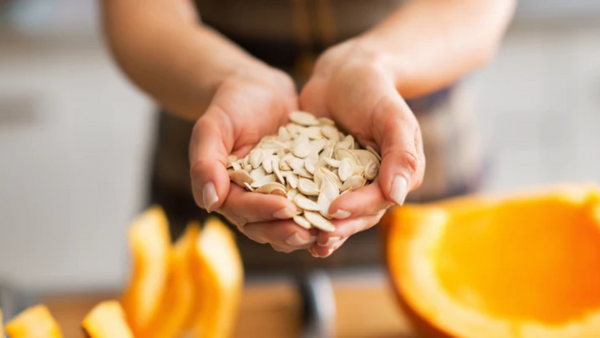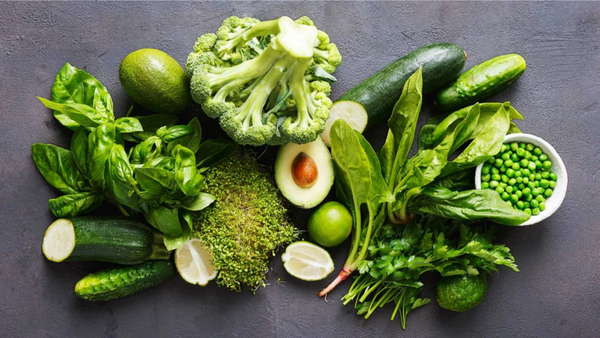In everyday life, very few people really think about their intestines. Its smooth functioning is assumed, and occasional problems are either ignored or simply accepted. Disorders or diseases of this sophisticated organ have an impact on the entire body - even on the brain. We have We have put together a small guide that explains important things about the topic and gives you tips on how to stay healthy in the long term.
IT'S WORTH READING!
AT THE END OF THE ARTICLE WE WOULD LIKE TO GIVE YOU A LITTLE JOY WITH A VOUCHER!
That's why your gut health is so important
Gone are the days when the intestine was thought to be a simple tube through which our food passes. Today we know that the intestine is an incredibly complex structure, and its health - including that of the approximately 100 trillion germs that live in it - affects the rest of our body. [1]
It is now also considered proven that there are connections between intestinal health and our immune system, our mental health and even autoimmune diseases. [2]
In connection with the intestine, you often read and hear the terms “intestinal flora”, “microbiome” or “microbiota”. In the case of the intestine, they all refer to the complex ecosystem of bacteria, fungi and other microorganisms that populate it. Without them and the mutual relationship with our body, the intestine would probably be as useful for nutrient absorption as a garden hose. [3]
Unfortunately, our modern life, especially the way we eat, poses a threat to a healthy and intact intestinal flora. Lack of sleep, stress, industrially processed foods, sugar consumption or antibiotics - not only do our intestines have to fight these things, but the possible damage to the brain, immune system, heart and other organs also pose a potential danger.
But how do you know if there is something wrong with your gut?
These signs may indicate a disturbed intestine
According to the Professional Association of German Internists (BDI), patients suffering from intestinal diseases often show the following symptoms: [4]
- Cramps and pain in the entire abdominal area
- Slimy, sometimes bloody stool with flatulence
- Diarrhea, constipation or other stool irregularities

The reasons for this are varied, as are the manifestations. For example, the following diseases can be the cause of the symptoms mentioned above:
- Crohn's disease. A chronic inflammation that affects the gastrointestinal tract and occurs in bouts. Typical symptoms include severe diarrhea and abdominal pain. [5]
- Ulcerative colitis. A chronic inflammation of the large intestine, indicated by mucous diarrhea. This is often accompanied by pain in the left upper abdomen. [6]
- Celiac disease. This intolerance of the gluten and gliadin proteins found in grains causes inflammatory reactions as well as severe abdominal pain. [7]
- The term irritable bowel syndrome describes a functional disorder of the digestive tract with accompanying flatulence, abdominal pain and diarrhea or constipation. The cause is believed to be psychological problems or poor nutrition. [8]
- An intestinal infection. Diarrhea and vomiting often indicate an intestinal infection. The triggers can be parasites or viruses, for example. In this case, it is often referred to as gastrointestinal flu.
In addition to the diseases mentioned above, there are a number of others that can affect the digestive tract, such as intestinal parasites, diverticula, inflammation of the appendix, leaky gut syndrome, and even colon cancer. [9]
And did you know? Sleep disorders or insomnia can also be signs of a disturbed microbiome. The reason: intestinal bacteria are an important component in the synthesis of the amino acid L-tryptophan . And this in turn is a basic building block of the hormone serotonin, the so-called "happiness hormone", which is important as a neurotransmitter for healthy sleep, for example. [10]
If you have problems with your intestines, you should definitely see a doctor to rule out serious illnesses.
But what can you do to keep your gut healthy?
Simple ways to achieve intestinal health
Aside from medication or therapy, there are things you can do yourself to maintain the health of your intestines or to support possible treatments.
1. Eat slowly
“Don't gobble so much, nobody's going to take anything away from you!” - Many of us have heard this sentence since childhood. In fact, it is sensible and good advice for a number of reasons. As far as the intestines are concerned, eating slowly and chewing thoroughly promotes digestion, because with well-chewed food the stomach has less work to do, and nutrient absorption is improved. [11]
2. Get enough sleep
Put your cell phone away, get off the couch, and go to bed - if you don't get enough sleep, it will affect your bowels. And bowel problems can lead to poorer sleep, as we explained above. Pay attention to your sleep hygiene too.
4. Drink plenty
The easiest way to maintain intestinal health is to drink. By this we don't mean alcohol, as that can be harmful. Water is the magic word. In sufficient quantities, it has a positive effect on the intestinal mucosa and promotes the balance between "good" and "bad" bacteria. [12]

5. Reduce stress levels
Stress in itself is not a bad thing. But if it becomes chronic, it puts a strain on the whole body. This of course includes the intestines. If you have a stress problem, you can try meditation, going for walks, drinking less caffeine or getting a pet. [13]
6. Change your diet
Processed, over-sugared foods are bad for the gut. But what is it that we see on every supermarket shelf? Exactly: processed, over-sugared foods! You should therefore always make sure that you don't fall into the trap and instead eat in a healthy way. Natural foods and a diet rich in fiber work wonders for your gut microbiome. [14]
And since we're talking about food: Which foods are particularly good for the intestines?
Which foods support your intestinal health?
The German philosopher Ludwig Feuerbach once said casually, "Man is what he eats." He hit the nail on the head. In general, a diet consisting of a variety of foods can lead to a diverse and robust microbiota. [15]
1. High-fiber foods
Fiber-rich foods - mainly plant-based - that the intestines cannot fully utilize are called dietary fiber. Their advantage: They thicken the food pulp in the stomach, allow the blood sugar level to rise more slowly after eating, and ensure that the stool is removed more quickly. [16]
They are found, for example, in wholemeal pasta, wholemeal rye bread, sweet potatoes, berries, dark chocolate or nuts. [17]
2. Fermented foods
Fermentation means the conversion of organic substances into alcohol, gases or acids with the help of enzymes, for example. During fermentation, probiotic processes are stimulated that have a positive effect on your intestinal microbiome.
A 2005 study by the University of Dundee showed that probiotics can promote the growth of many healthy bacteria, including bifidobacteria, which live in the intestines and keep harmful bacteria and other pathogens in check. [18]
Sauerkraut, pickles, kombucha or yogurt are just some of the foods you should include in your diet. They last longer, offer a variety of flavors and are good for your gut. [19]

3. Collagen-rich foods
The amino acids glycine, proline and hydroxyproline are important for repairing and rebuilding the intestinal flora. They are all contained in collagen .
A study published in 2017 in the Food & Function Journal of the Royal Society of Chemistry shows that the peptides contained in collagen can improve nutrient absorption in the intestine and help strengthen the intestinal barrier. [20]
You can get collagen through bone broth, gelatin or through collagen-containing supplements.
4. Foods with polyphenols
They are said to have many health benefits and have a positive effect on inflammation, blood pressure, cholesterol levels and oxidative stress: polyphenols . These are secondary plant substances that can be found in the outer layers of fruits, grains and vegetables, among other things. [21]
According to an article in the German Medical Journal, all available data indicate that “polyphenols promote protective bacteria in the microbiota and strengthen the intestinal barrier.” [22]
Foods that contain a lot of polyphenols include dark chocolate, cloves, dark wild berries, vegetables, coffee or black tea.
The intestine: Little noticed in everyday life, but still incredibly important
Your gut and its bacteria are important for many aspects of your health. Studies show that a disturbed microbiota can lead to numerous diseases and even affect our brain and mood.
The best way to maintain healthy gut flora is to follow simple rules, such as eating a range of fresh, whole foods such as vegetables, fruits, nuts and seeds, fish and high-quality meat.
AS PROMISED, YOU WILL RECEIVE A 10% VOUCHER ON OUR COLLAGEN .
SIMPLY COPY THE CODE KOLLAGEN+V10 AND ENTER IT AT CHECKOUT.
Click here to shop
[1] https://www.deutsche-apotheker-zeitung.de/news/artikel/2019/01/01/das-microbiom-und-die-darmflora
[2] https://pubmed.ncbi.nlm.nih.gov/15940144/
[3] https://www.ncbi.nlm.nih.gov/pmc/articles/PMC4290017/
[4] https://www.internisten-im-netz.de/fachbereich/magen-darm/haeufige-krankenen.html
[5] https://www.internisten-im-netz.de/krankenen/morbus-crohn/morbus-crohn-ursachen-unternehmen.html
[6] https://www.competencenetz-darmkrankenen.de/colitis-ulcerosa
[7] https://www.dgvs.de/wissen/leitlinien/leitlinien-dgvs/zoeliakie/
[8] https://www.apotheken-umschau.de/kranken-symptome/magen-und-darm Diseases/reizdarmsyndrom-was-steckt-dahinter-734665.html
[9] https://www.netdoktor.de/krankenen/darmkranken/
[10] https://pubmed.ncbi.nlm.nih.gov/12531142/
[11] https://pubmed.ncbi.nlm.nih.gov/26188140/
[12] https://www.ncbi.nlm.nih.gov/pmc/articles/PMC2908954/
[13] https://www.internisten-im-netz.de/fachfelder/psyche-koerper/psyche-verdauungssystem.html
[14] https://pubmed.ncbi.nlm.nih.gov/29902436/
[15] https://pubmed.ncbi.nlm.nih.gov/27110483/
[16] https://landeszentrum-bw.de/,Lde/Startseite/wissen/Ballaststoffe
[17] https://www.dge-sh.de/ballaststofflohn.html
[18] https://pubmed.ncbi.nlm.nih.gov/15647189/
[19] https://pubmed.ncbi.nlm.nih.gov/25209713/
[20] https://pubmed.ncbi.nlm.nih.gov/28174772/
[21] https://www.bzfe.de/ernaehrung/ernaehrungswissen/essen-und-wissen/sekundaere-pflanzenstoffe/
[22] https://www.aerzteblatt.de/archiv/186107/Microbiom-und-intestinale-Gesundheit-eine-hohe-Diversitaet-von-Darmbacterialen-ist-guenstig

















